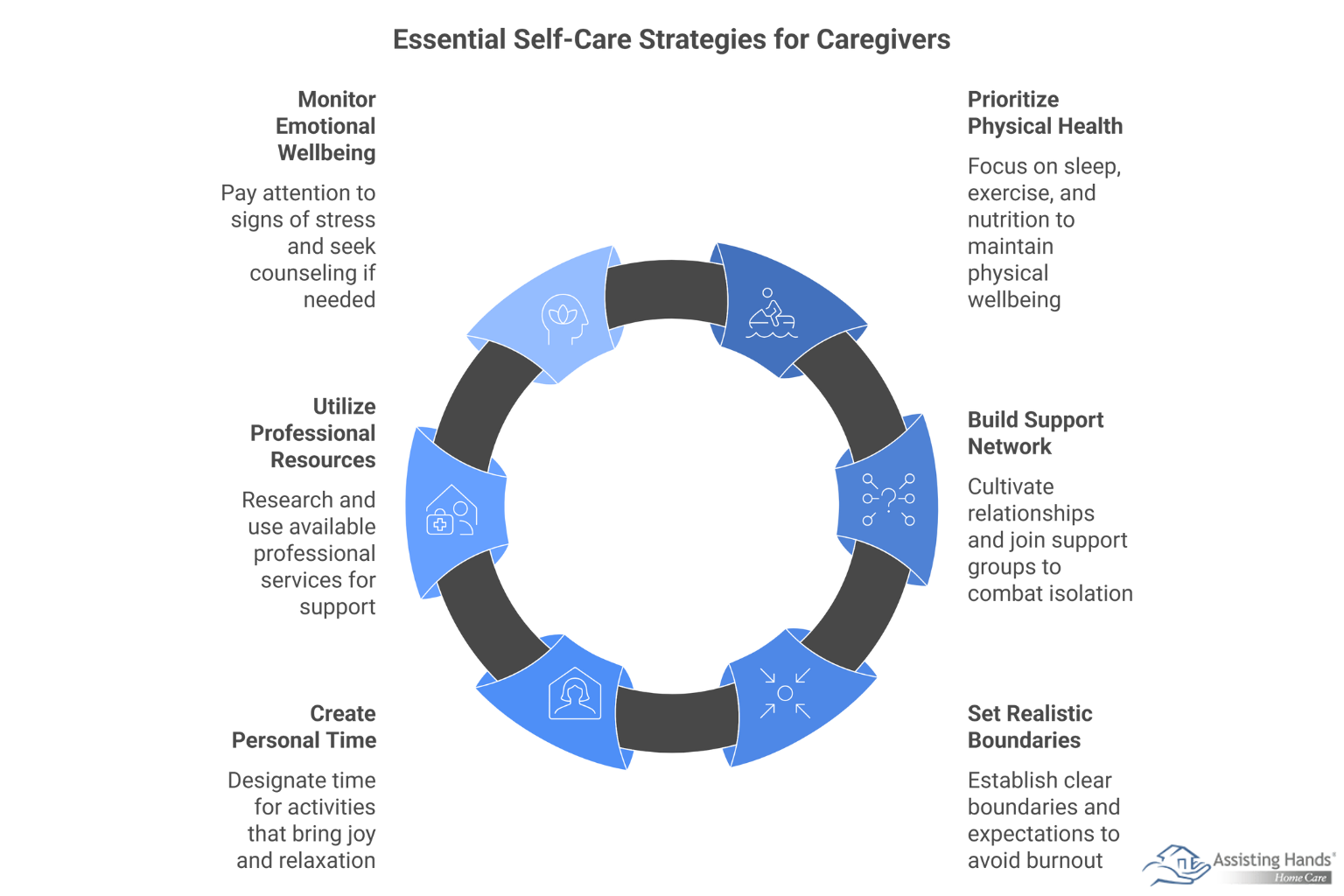
Table of Content
Caring for an aging family member at home can be both rewarding and overwhelming. While your focus naturally centers on your loved one’s wellbeing, neglecting your own physical and emotional health can lead to burnout and diminished caregiving abilities. These six practical self-care strategies will help you maintain your strength and resilience while providing the best possible care for your senior family member.
1.Prioritize Your Physical Health
Your body is your most important caregiving tool, so maintaining your physical wellbeing is essential. Start with the basics: aim for seven to eight hours of sleep each night, even if it means asking for help with overnight care duties. Poor sleep affects your decision-making abilities and emotional resilience.
Make time for regular exercise, even if it’s just a 15-minute walk around the block. Physical activity reduces stress hormones and boosts mood-enhancing endorphins. Consider these manageable options
- Morning stretches or yoga before your loved one wakes up
- Taking stairs instead of elevators when possible
- Parking farther away to add extra walking steps
- Doing bodyweight exercises during TV commercial breaks
Don’t skip meals or rely solely on fast food. Prepare simple nutritious meals you can share with your loved one, focusing on fruits, vegetables, lean proteins, and whole grains.

2.Build and Maintain Your Support Network
Isolation is one of the biggest challenges family caregivers face. Actively cultivate relationships with friends, family members, and other caregivers who understand your situation. Join local caregiver support groups or connect with online communities where you can share experiences and advice.
Consider these networking strategies:
- Schedule regular phone calls or coffee dates with friends.
- Attend community events when possible.
- Connect with neighbors who might offer occasional help.
- Reach out to family members who can provide respite care.
Don’t hesitate to ask for specific help. People often want to assist but don’t know how. Be clear about your needs, whether it’s grocery shopping, meal preparation, or sitting with your loved one for a few hours.
Families who need help caring for senior loved ones can turn to Assisting Hands Home Care, a leading provider of home care service. Services available in our customizable care plans include meal prep, mental and social stimulation, assistance with personal hygiene tasks, and much more.
3.Set Realistic Boundaries and Expectations
Perfectionism can be a caregiver’s worst enemy. Accept some days will be more challenging than others, and that’s completely normal. Set realistic daily goals and celebrate small accomplishments rather than focusing on everything you couldn’t complete.
Learn to say no to additional commitments that don’t serve your primary caregiving responsibilities or personal wellbeing. This might mean declining social invitations, reducing volunteer commitments, or limiting visitors during particularly stressful periods.
Establish clear boundaries with family members about care responsibilities. Create a care schedule that distributes tasks among available family members, ensuring the burden doesn’t fall entirely on your shoulders.
Seniors can face a variety of age-related challenges. Though some families choose to take on the caregiving duties, there may come a time when they need a trusted Henrico elderly home care provider. Families sometimes need respite from their duties so they can focus on their other responsibilities, and some seniors need around-the-clock assistance that their families are not able to provide. Assisting Hands Home Care is here to help.
4.Create Personal Time and Space
Designate specific times each day for activities that bring you joy and relaxation. This might be reading, listening to music, gardening, or practicing a hobby. Even 20 minutes of personal time can significantly impact your mental wellbeing.
Set up a personal retreat space in your home where you can decompress. This could be a corner of your bedroom, a spot in the garden, or even a comfortable chair by a window. Make this space sacred and use it regularly for quiet reflection or relaxation.
5.Utilize Professional Resources and Services
Don’t try to handle everything alone. Research local resources that can provide professional support:
- Adult day programs that give your loved one social interaction while providing you with respite
- Home health aides for personal care assistance
- Meal delivery services to reduce cooking responsibilities
- Housekeeping services to maintain your home
- Professional counseling to help you process emotions and stress
Many communities offer sliding-scale fees or volunteer programs that make these services more affordable. Contact your local Area Agency on Aging for information about available resources.
6.Monitor Your Emotional Wellbeing
Pay attention to signs of caregiver stress, including irritability, anxiety, depression, or physical symptoms like headaches and fatigue. These warning signs indicate you need additional support or respite.
Keep a simple daily journal to track your emotions and identify patterns or triggers. This practice helps you recognize when you need extra support and what strategies work best for managing stress.
Consider professional counseling, which many caregivers find invaluable for processing complex emotions about aging, loss, and family dynamics. Many therapists specialize in caregiver support and can provide practical coping strategies.
Remember taking care of yourself isn’t selfish. It’s essential for providing high-quality care to your loved one over the long term.
Family caregivers need to care for their own wellbeing. If you’re caring for an aging loved one and are feeling overwhelmed, consider hiring a professional caregiver to provide respite care. Richmond families who want to prevent burnout can turn to Assisting Hands Home Care. One of our professional caregivers can assist your loved one at home while you take a nap, go to work, run errands, or go on vacation. For reliable in-home care services, contact us today.
